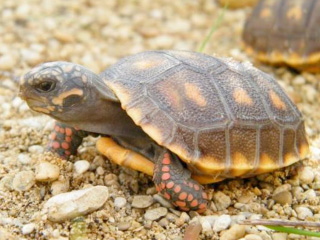Shell shocked! Tiny tortoises surprise at Cotswold Wildlife Park

Reptile keepers at Cotswold Wildlife Park recently discovered four newly hatched Red-footed Tortoises (Geochelone carbonaria) while carrying out maintenance duties in their former enclosure. The newborns’ parents had recently been moved to another zoological collection as part of a breeding programme. Having laid the eggs prior to their departure, the Reptile team were unaware that four tiny Tortoises were about to be born.
Jamie Craig, Curator at Cotswold Wildlife Park, said: “The baby Tortoises were quite a surprise for the Reptile team. Normally eggs won’t develop unless removed to an incubator as conditions for hatching need to be perfect and this is difficult when eggs are deposited in the gravel. However, all the youngsters are doing very well and are completely unaware of the drama their arrival created.”
In the wild, it is common for these Tortoises to bury their eggs deep in the sand and then abandon them. So, while the find was surprising, their behaviour at the Park was no different to how it would be in the natural world. In fact, during the nesting season, the female does not incubate the eggs at all. They are well-disguised to avoid predators. She will bury the brittle eggs and around one hundred and fifty days later, they will hatch. They are completely independent from the moment they’re born.
The new hatchlings are less than two inches in length, weigh approximately thirty grams each and have just gone on show to visitors in the recently refurbished Reptile House. These South American Tortoises will eventually grow to fifteen inches in length and have a life expectancy of fifty years.
The Red-footed Tortoise was the subject of a 2011 scientific study to discover why humans yawn when they see another human yawn. The study entitled ‘No Evidence of Contagious Yawning in the Red-Footed Tortoise’* attempted to find out if contagious yawning was a purely human phenomenon. It concluded that it was. This particular species were chosen due to their responsiveness, making them “ideal subjects for examining this question.”
Additional information:
- Red-footed Tortoises have not been bred at the Park since 2003.
- The collective noun for a group of Tortoises is ‘a creep’.
- Tortoises are famous for living to a ripe old age. The oldest on record was a Giant Tortoise named Adwaita. He was believed to have lived for two hundred and fifty five years in Calcutta Zoo and died of liver failure in 2006.
- A Red-footed Tortoise named Manuela was discovered in February this year after surviving thirty years in a box**. The Tortoise mysteriously “disappeared” from a home in a suburb of Rio de Janeiro, Brazil, in 1982. The family pet was assumed to have escaped during a house move. The family were stunned when he was discovered thirty years on in a wooden box. His survival still amazes both vets and scientists.
- Red-footed Tortoises are sadly hunted extensively for food in their countries of origin.
- Tortoises are considered “fish” by the Catholic Church and during Holy Week are consumed in huge numbers.
Cotswold Wildlife Park opens its doors at 10am every day, with last admission at 3.30pm
Explore Gloucestershire
22 December 2013
For further information.
OTHER NEWS
